 | 09 10 07 flight 1 (2011-06-20)      October 7, 2009 - Masten Space Systems flew our XA0.1B-750 rocket vehicle in the Northrop-Grumman Lunar Lander Challenge, level one. Both Flights were successful meeting the required flight profiles and time conditions. We are now in a position to claim the second prize award of $150, 000. First prize was awarded in 2008 to Armadillo Aerospace. Two other teams are scheduled to compete in the competition window that ends on October 31, 2009. Level one requires a rocket vehicle to take off from one pad, fly to a minimum altitude of 50 meters, move to a second pad a least 50 meters away and be in the air for a minimum of 90 seconds. The rocket may then be refueled before is repeats the flight back to the original starting point. The accuracy of the landing determines the winner in the case where more than one team flies the required profile. The average landing accuracy for "Xombie" was 16cm (unofficial pending judging). This video is the first flight leg to "pad B" shot from the ground by Mike Masse. Press- Please contact Masten Space Systems for official news releases and access to higher quality media files.
|
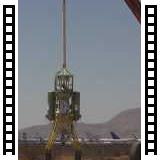 | 2009.07.31 Flights 17-21 Composite (2011-06-22)      This is a composite of flights 17-21 of Masten Space Systems XA0.1B-750 test vehicle. We were testing taking off closer to the ground, landing sequences and small translations in preparation for flying without the tether. Confidence is gaining as testing is going exceptionally well. Five flights before lunch is our current best and we hope our luck continues to hold as we expand flight profiles.
|
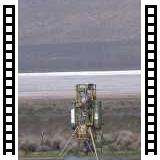 | 20March2010 Xombie (2011-06-24)      XA-0.1-B (Xombie) boosted hop to 1047'. Masten Space Systems flew Xombie to its highest altitude yet! All systems functioned well. Xombie landed within roughly 3" of its take off point. A special thank you to the Friends of Amateur Rocketry for letting us use their facility.
|
 | Feb2010QuickClips1.mov (2011-06-22)      This is a compilation of clips from this year (Xombie) with a couple of previously posted videos from testing last year. There is also a segment from our NGLLC Level 2 winning flights. The shop is very busy with all sorts of projects so there hasn't been time to spend much effort on processing video. We will keep posting as we can squeeze in a few minutes here and there. Visit www.masten-space.com for more information. Press - Contact us for higher resolution media files at the email addresses on our website.
|
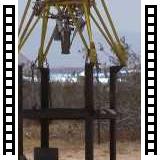 | Hold Down XA-0.1B-750 2009.07.16 (2011-06-22)      This is a short hold down test of Masten Space Systems XA-0.1B-750 VTVL rocket vehicle. Notice the red hot metal under the rocket exhaust. The concrete paver used to deflect heat from the steel plates has a very cool glass coating on it now. We'll collect that for our gallery when it's cooled down. Local Temp: 106F. Yes, we're crazy.
|
 | Masten Space Systems Static Test May 19, 2009 (2011-06-24)      300 fps video from a Masten Space Systems static test on May 19, 2009 simulating a flight. Actual burn lasted 9 seconds. Different throttle levels are simulated during this test. A graphite plate used for many of our static tests finally gives out halfway through the flight and can be seen distributing itself across the test site. Sorry - no sound from the high speed camera.
|
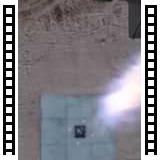 | NGLLC leg1down (2011-06-21)      October 7, 2009 - Masten Space Systems flew our XA0.1B-750 rocket vehicle in the Northrop-Grumman Lunar Lander Challenge, level one. Both Flights were successful meeting the required flight profiles and time conditions. We are now in a position to claim the second prize award of $150, 000. First prize was awarded in 2008 to Armadillo Aerospace. Two other teams are scheduled to compete in the competition window that ends on October 31, 2009. Level one requires a rocket vehicle to take off from one pad, fly to a minimum altitude of 50 meters, move to a second pad a least 50 meters away and be in the air for a minimum of 90 seconds. The rocket may then be refueled before is repeats the flight back to the original starting point. The accuracy of the landing determines the winner in the case where more than one team flies the required profile. The average landing accuracy for "Xombie" was 16cm (unofficial pending judging). This video is the first of the two competition flights from the downward facing camera located onboard the rocket. Press- Please contact Masten Space Systems for official news releases and access to higher quality media files.
|
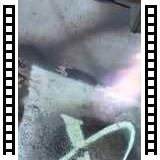 | NGLLC leg2down (2011-06-22)      October 7, 2009 - Masten Space Systems flew our XA0.1B-750 rocket vehicle in the Northrop-Grumman Lunar Lander Challenge, level one. Both Flights were successful meeting the required flight profiles and time conditions. We are now in a position to claim the second prize award of $150, 000. First prize was awarded in 2008 to Armadillo Aerospace. Two other teams are scheduled to compete in the competition window that ends on October 31, 2009. Level one requires a rocket vehicle to take off from one pad, fly to a minimum altitude of 50 meters, move to a second pad a least 50 meters away and be in the air for a minimum of 90 seconds. The rocket may then be refueled before is repeats the flight back to the original starting point. The accuracy of the landing determines the winner in the case where more than one team flies the required profile. The average landing accuracy for "Xombie" was 16cm (unofficial pending judging). This video is the second flight to return to the starting point from the downward facing camera located onboard the rocket.
|
 | NGLLC leg2out (2011-06-22)      October 7, 2009 - Masten Space Systems flew our XA0.1B-750 rocket vehicle in the Northrop-Grumman Lunar Lander Challenge, level one. Both Flights were successful meeting the required flight profiles and time conditions. We are now in a position to claim the second prize award of $150, 000. First prize was awarded in 2008 to Armadillo Aerospace. Two other teams are scheduled to compete in the competition window that ends on October 31, 2009. Level one requires a rocket vehicle to take off from one pad, fly to a minimum altitude of 50 meters, move to a second pad a least 50 meters away and be in the air for a minimum of 90 seconds. The rocket may then be refueled before is repeats the flight back to the original starting point. The accuracy of the landing determines the winner in the case where more than one team flies the required profile. The average landing accuracy for "Xombie" was 16cm (unofficial pending judging). This video is the second flight to return to the starting point from the outward facing camera located onboard the rocket.
|
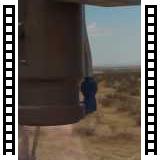 | RocketEngineEyeView2.mov (2011-06-22)      28 July 2010 was nice day for flying rockets. This video is what you might see if you were strapped to one of the landing gear legs of our rocket Xombie. No, you cannot book rides. This is mostly a training flight for new employees starting at Masten Space. We also just plain like flying rockets, so we make excuses such as needing regular flights to "stay proficient". The management buys it, so we get out of the office. We are working hard on some really cool stuff that we won't talk about yet. Do I make you shiver with antici,,,,,,,,,,,,,,pation?
|
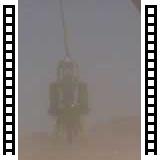 | Tethered Test XA-0.1B-750 2009.07.16 (2011-06-22)      This test is to verify a faster engine start sequence and automatic landing routines. Ian Garcia, our resident Guidance, Navigation and Control software genius was pleased with the results. That's it for today, we are all burning up and ready to get back to the shop (and air conditioning). Stay Tuned for more. Subscribe and be notified of each new post. Local Temp: 104F
|
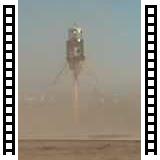 | XA0 1B 750 091509 FreeFlight (2011-06-22)      The leash is finally off of Xombie. This is a video of the Masten Space Systems XA0.1B-750's first free flight (Flight 27). It's been a busy last few weeks preparing the rocket for the Northrop-Grumman Lunar Lander Challenge. Competition flights are 9/16 early in the morning and 9/17/09 if necessary. The flight profile is 50 meters up, 50 meters over to another pad and a flight duration of at least 90 seconds. The vehicle is refueled and completes the flight profiles again landing at the original pad. Fueling and replenishment must be completed in a set time window. If more than one team flies successfully during the competition window ending October 31, the team that lands closest to the designated marks will take the second place prize this year. Armadillo Aerospace won the first place prize in 2008. The crew is tired and off to bed for a needed nap before the competition. Masten Space Systems develops VTVL rocket vehicles for sub-orbital payloads.
|
 | XA0 1B NGLLC 091609 (2011-06-22)      On Wednesday September 16, 2009, Masten Space Systems flew our XA0.1B-750 rocket vehicle in the Northrop-Grumman Lunar Lander Challenge, Level 1. The flight on the first leg was awesome to watch. This was the second untethered flight of "Xombie" (flight 29). The rocket reached an altitude of 53 meters and moved to the second landing pad 60 meters away with a 92 second flight time. We landed a tiny 19.7cm from center of our target. Upon inspection of the engine before preparing for the return trip, our staff found some minor damage to the engine. It was decided to not take the risk of flying the second leg and living to fly another day. Our next competition window is in early October and that should allow us plenty of time to identify the cause of the damage and make corrections. The first half of the video is from the downward pointing onboard camera. The second half of the clip shows the view from the outward pointing camera. Yes, we turn the concrete into glass as we take off and land. The green flashes in the exhaust plume are burning bits of the engine chamber that gave us the indication that we should inspect the engine very thoroughly. Overall, we are very pleased with the performance of the rocket and how well our team worked together today. Masten Space Systems is developing Vertical Takeoff, Vertical Landing (VTVL) rockets to fly payloads to sub-orbit.
|
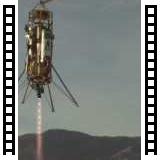 | XA01B750_010810_2.MOV (2011-06-22)      Masten Space Systems is back to flying in 2010. This video is of the second flight of the day (1/8/10). The team is getting back into the groove of building and testing after our NGLLC wins last year and the following holidays. We have lots of exciting projects in the works.
|
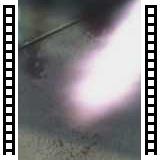 | XA01b750_010810_2d.MOV (2011-06-22)      Looking down from the rocket of our second flight of 2010 of XA-0.1B-750. Not as exciting as the view during the NGLLC flight, but we like rocket engines here. More flights coming up soon.
|
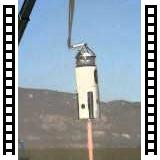 | Xaero 20110512 Tether Flight.mov (2011-08-17)      Here is a glimpse of our tethered test sequence. With the tied down (or tied up) tests completed, this is the next step in qualifying our Xaero rocket vehicle for flight. In addition to testing the various aspects of the hardware and shaking out bugs in the software, we are also refining our crew operations. Today (05.12.11) we completed 3 tethered flights. Yesterday, we ran 5 tethered flights. It shouldn't be long before the chains come off and the free flights begin. Stay tuned for more updates. Media: contact Masten Space Systems for higher resolution video.
|
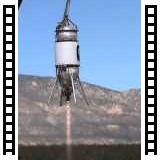 | Xaero Depletion Run (2011-06-24)      This is the forth tether flight of Xaero. This is a flight that runs until the fuel is gone. This makes for a good impromptu test of the structure at the end of the run when the rocket flames out and is caught by the tether. We did not fill the fuel tank all of the way up on this flight. The flight test went well and we'll be back out to fly some more after the crew has the chance to analyze the data.
|
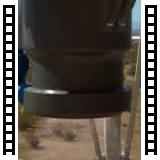 | Xombie flying rocket shuts down and restarts in mid-air (2011-09-24)      On May 26, 2010 Masten Space Systems demonstrated an in-air relight on our VTVL reusable rocket, XA-0.1B (Xombie). This test flight was a major step towards flying payloads to sub orbit. This is a view from a camera mounted on one of the landing legs.
|

























































































































